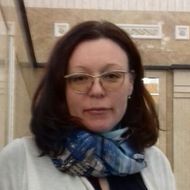- A
- A
- A
- ABC
- ABC
- ABC
- ąÉ
- ąÉ
- ąÉ
- ąÉ
- ąÉ
- HSE Campus in St. Petersburg
- St Petersburg School of Economics and Management
- Department of Management
- News
- Elena Korchagina and Pavel Shilo, Lecturers of the HSE Faculty of Management, Participated in International Teaching Week
194100 Saint Petersburg,
3 Kantemirovskaya Street, Room 223, 218, 203

The Department of Management was set up in 2014 on the basis of the Faculty of Management and is a part of the School of Economics and Management which brings together economists and managers. The distinguishing feature of this department is the limited combination of theoretical science, applied science and close interaction with the real economic sector.
ąÉą▒čĆą░ą╝ąŠą▓ą░ ąś. ą×., Amuhaya C. Ayuma, Degterev D. A. et al.
M.: National Review, 2023.
Elena Rapoport, Volkova N., Barajas A.
Technology in Society. 2026. Vol. 84.
In press
Magdalena Gaete, Khalid H., Sofia Glebova et al.
In bk.: Bridging Horizons: Social Entrepreneurship in Malaysia and Russia. Kuala Lumpur: UTM Press, 2025. P. 77-92.
Dagaev D., Paklina S., Reade J. et al.
Department of Economics Discussion Paper. . University of Reading, 2021. No. 2021-14.

Elena Korchagina and Pavel Shilo, Lecturers of the HSE Faculty of Management, Participated in International Teaching Week
ŌĆö How did you come to participate in this event?
ŌĆö The University of P├®cs is partner of the HSE campus in St. Petersburg, and we were invited to participate in International Teaching Week directly by the university. The topic and the programme seemed very interesting, and so we decided to apply.
ŌĆö What events did the International Teaching Week include?
ŌĆö International Teaching Week mainly consisted of two types of events. First, there were roundtable and plenary sessions with lecturers, students and other guests, including representatives of partner universities, non-profit organizations, and businesses. The topics of the plenary sessions and roundtable discussions were related to the problems of creating entrepreneurial competencies during study at university and the challenges facing educational institutions today.
Second, there were guest lectures as part of regular courses. Elena read a lecture on Environmental Ethics as part of the course on Business Ethics, which is led by Professor Marta Somogyvari, and Pavel read a lecture on Leadership and Strategic Management as part of a course on Leadership and Management of International Business, which is led by Prof. Vitai Zsuzsanna.┬Ā
ŌĆö What was your impression about the university?
ŌĆö The university impressed us; the Faculty of Business and Economics is situated in a beautiful old building. ItŌĆÖs interesting that it was the city of P├®cs where the first university in Hungary was founded in 1367. The modern university is not a direct successor of the old university, but the influence of history and tradition can be felt there. Today the university includes over 25,000 students and about 2,000 teachers, while the population of P├®cs is about 160,000 people. The university is also the largest non-industrial employer in the city.
ŌĆö How does a university benefit from organizing such an event?
ŌĆö We think that the benefits are considerable and are undoubtedly worth the costs of time, effort and money. First, the university gets an opportunity to evaluate guest lecturers to possibly later invite some of them to work at their institution. It seems perferable to select lecturers on the basis of such events rather than to invite them as a result of recommendations. Second, exchanging experiences of how to conduct classes, introduction to methods and style of reading lectures and seminar organizations are also valuable. In this case everyone benefits, both the hosts and the guests. Third, getting to know each other, discussions, and exchange of opinions are also important and valuable activities. ItŌĆÖs impossible to develop if you have no contact with the external world and if you have no opportunities to compare yourself with the others. ThatŌĆÖs why we believe we should promote such events at the Higher School of Economics, especially in St. Petersburg.
ŌĆö What benefits did you personally get from participating in International Teaching Week?
ŌĆö We met remarkable people, participated in interesting debates and exchanged opinions, compared different approaches to teaching, and learned several original teaching methods. An important result of this event was widening our network of contacts in the academic community. ItŌĆÖs nice that our research and teaching skills were highly evaluated by our international colleagues, and the hosting university issued letters of appreciation for us. In addition to this, we got several offers of cooperation from universities in Canada, Finland, and Lithuania, whose representatives also participated in the event. We believe that our participation in International Teaching Week was really useful and hope that it will be a good contribution to the development of international links of the HSE campus in St. Petersburg.
Letter of appreciation from the University of P├®cs to E. Korchagina
Letter of appreciation from the University of P├®cs to P. Shilo


.jpg)